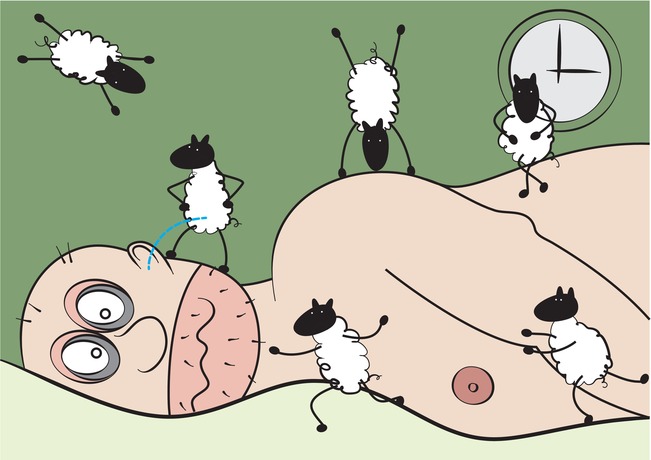100, 99, 98, 97 … 5, 4, 3, 2, 1 … and let’s start counting those sheep all over again.
Do you have trouble falling or staying asleep? You’re not alone. Most of us have experienced occasional insomnia but for some people, lack of sleep is a chronic issue.
Every once in a while probably won’t cause any problems, but when it’s a nightly occurence, insomnia can lead to a number of physical and mental health issues.
What can happen if you have chronic insomnia
- Increased risk of high blood pressure, heart disease and diabetes
- Depression and/or anxiety
- Lower performance on the job or at school
- Slowed reaction time while driving and higher risk of accidents
- Weight gain
- Irritability
- Substance abuse
- Weakened immune system
- Memory impairment
What the brain does when you’re sleeping
Exactly what happens during sleep that is so important to our brain function is still a scientific mystery. When you think about it, being sound asleep could put you in mortal danger in certain circumstances, so why do our bodies need to be in that state for several hours?
Studies have shown that sleep helps restore and repair the brain. It’s also during sleep that the brain decides what information it took in during the day should be forgotten and what should be remembered.
A paper published in Science last year suggests that while we sleep, our brain is hard at work cleaning house— sweeping away all the waste and litter that accumulated that day — including beta-amyloid, a protein associated with Alzheimer’s disease, the most common cause of dementia.
Another report that came out this summer shows that sleep disorders may increase the risk of Alzheimer’s disease. Researchers at the University of California at San Francisco conducted a sleep study on a large sample of veterans and found that those with diagnosed sleep disorders, such as sleep apnea, were 30 percent more likely to suffer dementia than veterans without those problems.
Sleep apnea and dementia
Ken Capron, who lives in Portland, has central sleep apnea. His brain doesn’t send the right signals to the muscles that control his breathing. During a sleep study he woke up gasping for air 51 times an hour. Each time, his brain was oxygen deprived. Even if only for a second the loss is cumulative and kills his brain cells. Most people with sleep apnea have the obstructive kind, which prevents them from breathing because something is obstructing their upper airway.
About 10 years ago, Ken diagnosed with dementia, which he was told was linked to his sleep apnea. “I was on a business trip to Long Island,” he told me. “I remember being there but I don’t remember the trip down and back. I used to read maps really well and I struggled. I had four maps trying to figure out where I was going. It was really unusual. I was also experiencing trouble getting words out, which is something I think a lot of Alzheimer’s and dementia-related people have.”
While so far, none of the recents studies about the specific role of sleep is conclusive, it’s clear that sleep is critical for our physical and mental health.
How many hours do you need?
According to the National Institutes of Health (NIH), children and adolescents need more sleep than adults. Infants need about 16 hours a day and teenagers about nine. Older adults need about the same amount as young adults — between seven and eight hours a night.
When to see your doctor
Because sometimes insomnia is caused by a medical condition, if it’s been going on for longer than three or four weeks or if you can’t function well during the day, it’s probably time to see the doctor.
Eight simple lifestyle changes
If there is no underlying medical cause, Harvard Medical School recommends these simple lifetyle changes.
IN THE EVENING
1. Eat a light dinner. A heavy meal can lead to heartburn. Avoid caffeinated drinks, alcohol and chocolate.
2. Turn off TV and all electronic devices at least 30 minutes before bed. Read a book (not on a tablet), take a warm bath or listen to soft music.
3. Prepare bedroom ready for sleep. Dim the lights, close the curtains, make sure the temperature is cool and comfortable and cover your alarm clock so you can’t see the time if you wake up in the middle of the night.
4. Go to the bathroom before bed.
5. Try to go to bed at the same time every night. If you can’t fall asleep in 15 minutes, leave the bedroom. Sit somewhere quiet and read a book for 15-20 minutes or until you get sleepy. Then go back to bed.
IN THE MORNING
6. Wake up at the same time each morning, even on weekends.
7. Limit yourself to just one cup of caffeinated coffee at breakfast or drink decaf. Too much caffeine in the morning can stay with you until bedtime. (If you’re used to drinking several cups of coffee a day, wean yourself off it gradually over a few weeks.)
8. Get outside for a 30 minute walk. Both exercise and morning sunlight can help you sleep better.
Do you have any sleep tips to share?
When I can’t sleep, I read. What do you do?


Sometimes when I wake up and can’t get back to sleep I grab a snack like a banana and a glass of milk. I read that low blood sugar can make a person fidget or become restless. This seems to help.